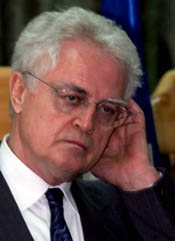Jointly published by the United States Committee for a Free Lebanon and the Middle East Forum
Back to March 2000 Table of Contents
Back to Middle East Intelligence Bulletin homepage.
Jospin's Infamous Remark Reveals Split in French Consensus on Mideast
MEIB Staff
 |
| Lionel Jospin |
French Prime Minister Lionel Jospin's use of the words "terrorist acts" to describe Hezbollah attacks against IDF troops during his visit to Israel last month has been interpreted by most observers as a stupendous foreign policy blunder. After refusing to retract the remark, Jospin was pelted with stones by protesting Palestinian students and lambasted by nearly every media outlet in the Arab world. French President Jacques Chirac quickly rebuked Jospin.
However, Jospin is not known for making diplomatic gaffes. He remained defiantly unapologetic after Chirac told him by phone that his behavior could "undermine the credibility" of French foreign policy. "What is Chirac going to tell me, that I transgressed Middle East politics? It's not true," Jospin told Israeli reporters. "He can't tell me that the Hezbollah are angels."1 When a senior French Foreign Ministry official remarked that "this is what happens when you don't do your homework," Jospin promptly fired him.2
The spectacle appears to be representative of an underlying split between the socialist wing of the French government represented by Prime Minister Jospin (with the support of the National Assembly) and the conservative wing represented by President Chirac. The dispute may be the opening shots in the breakdown of an uneasy power-sharing relationship which the French call "cohabitation."
Both wings of the French government have hitherto observed a broad consensus on foreign and defense policy. For French policy towards the Middle East, "cohabitation" has meant a compromise between the relatively pro-Israeli policies advocated by most socialist politicians and the pro-Syrian sympathies of President Chirac. In departing so abruptly from this tacit understanding, Jospin apparently intended to challenge Chirac's lead role in foreign affairs in advance of the 2002 French presidential elections.
Jospin's remarks should therefore be seen as a calculated decision to solidify his political support among French liberals in general and the French Jewish community in particular. In fact, Henri Hajdenberg, president of the European Jewish Congress and of CRIF, an umbrella organization of secular French Jewish groups, accompanied Jospin to Israel and later told the French daily Le Figaro that Jospin's visit was "a re-balancing" in French foreign policy. "France lost confidence in Israel in 1967 and had never rediscovered it since," said Hajdenberg.3
It is worth noting that Jospin also broke with standard practice for European diplomats by refusing to meet with Palestinian Authority (PA) representative Faisal Husseini at the Orient House, the PA's unofficial headquarters in East Jerusalem (the meeting was held at neutral site in West Jerusalem). Jospin's refusal was clearly intended to avoid any recognition of Palestinian claims in the Holy City.
Other officials have taken Jospin's lead and departed from the script that has guided French foreign policy towards the Middle East in recent years. Most notably, French Defense Minister Alain Richard described a recent Hezbollah attack which killed five SLA militiamen as an "act of war" and said that an obstacle to the peace process is the "complex situation in Syria and Lebanon, in which the Syrian regime has some means of pressure, like Hezbollah."4 Interestingly, Romano Prodi, president of the EU Commission, also took Jospin's lead by declining to visit the Orient House during his recent visit.
1 "French prime minister's blunt talk seen as effort to boost Mideast role," Jewish Telegraphic Agency (JTA), 29 February 2000.
2 Liberation (Paris), 1 March 2000.
3 JTA, 29 February 2000.
4 Europe 1 Radio, 1 March 2000.
� 2000 Middle East Intelligence Bulletin. All rights reserved.
MEIB Main Page

